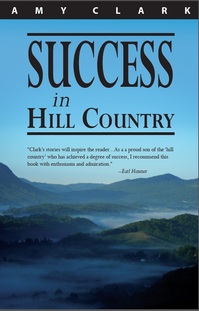 Success is not one of the stereotypes of Appalachia or its people. If you watch TV, the images are of the violence and drugs of “Justified,” moonshiners like Popcorn Sutton, the crazy dancing outlaw Jesico White of West Virginia and a host of other images in which “role model” never comes to mind.
Success is not one of the stereotypes of Appalachia or its people. If you watch TV, the images are of the violence and drugs of “Justified,” moonshiners like Popcorn Sutton, the crazy dancing outlaw Jesico White of West Virginia and a host of other images in which “role model” never comes to mind.
My cousin, Dr. Amy D. Clark, an English professor at the University of Virginia’s College at Wise, hopes to change a few Appalachian stereotypes, at the very least, for the young people living on its hills and in its hollers.
Working with the Napoleon Hill Foundation, she collected success stories from Appalachian sons and daughers into Success in Hill Country.
The book was published March 2 and the official launch with an author signing and a reading will be April 28 at the Southwest Virginia Museum in Big Stone Gap, Va.
 Clark collected oral histories from, among others, NASCAR president Mike Helton (from near Bristol, Va.), former NFL player and College Football Hall of Famer Carroll Dale from Wise, Va., author Lee Smith who grew up in Grundy, Va., and novelist, television writer and film director Adriana Trigiani, who hails from Big Stone Gap, Va.
Clark collected oral histories from, among others, NASCAR president Mike Helton (from near Bristol, Va.), former NFL player and College Football Hall of Famer Carroll Dale from Wise, Va., author Lee Smith who grew up in Grundy, Va., and novelist, television writer and film director Adriana Trigiani, who hails from Big Stone Gap, Va.
In addition to personal advice on what made them successful, Clark explores how where you come from is as important as where you are going.
Among her inspirations for doing the book was her own childhood. As she writes on her blog:
“I knew I wanted to write something that could inspire young people, particularly those like me from the mountains or otherwise rural places that might be all but forgotten. I remember as a teenager thinking about what I would do in life and feeling convinced that to make something of myself I’d have to leave home, that there was no success to be found here in the hills and hollers, the farthest place imaginable from where Important Things were Happening, places like Los Angeles and New York City. I loved the mountains and everything about our way of life (and still do): the way we talk, our seasonal work like harvesting tobacco and making molasses, the old-timey hymns we sang in church. But I saw nothing resembling our way of life on television or in the magazines that came in the mail. The one television show we could relate to, even though it was set during the Depression, was The Waltons, because it was about a rural family who sounded a little like us and lived in the mountains. (I’m proud to say the creator of that show, Earl Hamner, read this book.)”

American self-help writer Napoleon Hill (1883-1970) posing for a portrait (Photo credit: Wikipedia)
Who was Napoleon Hill? Born in a one-room cabin in Pound, Va., in 1883, he was a journalist by 13 and an interview with that titan of American capitalism, Andrew Carnegie, in 1908 changed his life. Carnegie believed there was a formula for success and commissioned Hill to do the research. He interviewed some 500 people in the project, the most famous and most successful people of the early 20th century, for a three-volume book called “The Law of Success.”
The research launched a new career for Hill, who was one of the earliest personal-success writers. His most famous book, “Think and Grow Rich,” has sold millions upon millions of copies. Hill, and his organization after his death, have churned out self-help title after title and created an industry around his principles of success.
Hill is known for many sayings. Among them:
“Whatever the mind can conceive and believe, it can achieve.”
“Happiness is found in doing, not merely possessing. ”
“Do not wait: the time will never be ‘just right’. Start where you stand, and work whatever tools you may have at your command and better tools will be found as you go along.”
“Most great people have attained their greatest success just one step beyond their greatest failure.”
Maybe, just maybe, some of the Appalachian stereotype spotlight will shine on people like Hill and those in Clark’s book.
